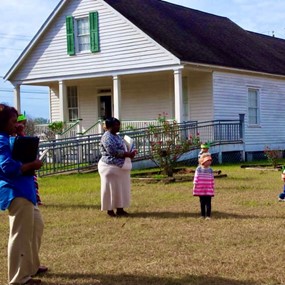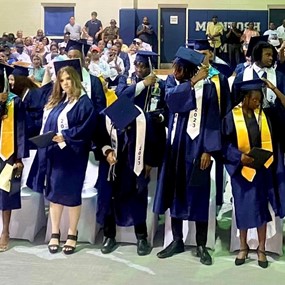Chatom churches offer support, build community
Communities all have their own way of getting together and building relationships. In Chatom, many find those opportunities and more through local churches. Chatom, which is about 11 square miles, is home to 13 churches.
Pastor Jerry Roberts of Chatom Baptist Church said that their goal is to “clothe those who need to be clothed, feed those who need to be fed.”
In response to the school closures because of COVID-19, the church opened doors to students looking for lunches and helped feed the community’s youth for two months.
Carl Craig, an active member of Chatom Baptist, said, “We’ve helped feed folks, clothe folks.” He said the church also helps support a nursing home and a home that helps battered women.
Even before COVID-19 hit, the church worked closely with local schools, sponsoring events and organizations. They also founded the “Mission One Project”, where they work to generally provide for the needy in the community.
Pastor Roberts said, “The church is very connected. Anything and everything we can do, we try to be a part of it. Last year, Washington County High School’s football team visited every church in the city at the request of the coach.”
Craig added that they regularly supply backpacks and school supplies to the students in Chatom.
The churches in Chatom are a central part of community, both as a faith and in their role of bringing people in the community together.
As Pastor Roberts puts it, “Chatom is unique and different. We will have Fourth of July celebrations that have 6,000 to 7,000 people at them.” Chatom, a city of 1,200 and county seat, brings in many people from the surrounding areas to celebrate.
Pastor Roberts said many local churches in Chatom help build the sense of community.
“It was started way before I was a part of it, and I’m just so thankful to have an opportunity to come to Chatom,” Roberts said.
Holly Morales, pastor of Chatom United Methodist Church, said of local churches, “They’re a huge part of the culture. They’re probably the biggest part of the culture.”
She said her congregation has also worked to provide for the needy in Chatom, both prior to and during the pandemic. The Methodist church also provided food and supplies to students and helps to get backpacks to students in the area.
“We’ve done a lot with the schools, a lot of meeting individual needs,” Morales said.
Both Dr. Morales and Pastor Roberts, both non-native residents of Chatom, share the sentiment that Chatom is unique in some way and not burdened by the stereotype of being closeminded and exclusionary that is put on a lot of rural, southern towns.
Morales said, “I think there is that cliché of a small town, and I’ve had other pastors say that to me ‘You know, how do you stand up there?’. I explain they are pretty open… you’d be surprised. I think people expect they are not going to be.”
Roberts added, “It’s way different than I ever imagined that it would be.”
Tags: Chatom


